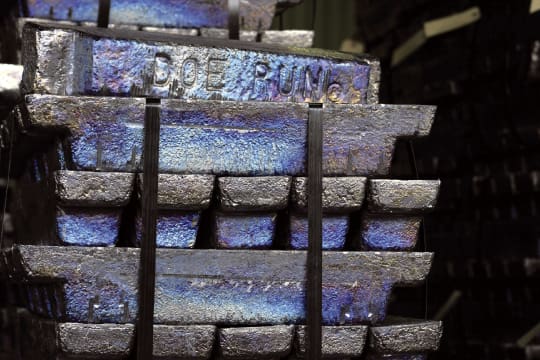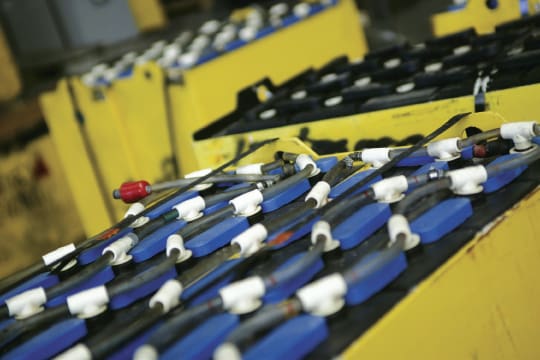
The closure of the last primary lead smelting plant in the United States in Herculaneum, Missouri will not have any noticeable effect on ammunition supplies or prices, NSSF and ammunition manufacturers say. Why are they pulling a Clark Gable-like “Frankly, my dear, I don’t give a damn?” Because the U.S. ammunition industry has reached a recycling milestone that even patchouli-scented, free-range organic vegan Birkenstock Bolsheviks can only dream of: they use nearly 100% recycled lead . . .

The distinction here is that Doe Run is only shutting down its ‘primary’ lead smelter. This smelter turns lead ore into primary lead ingots. Some electronic and scientific applications require this extremely pure ‘virgin’ lead, but ammo makers don’t care. They don’t mind a higher level of impurities as long as the final mix has the right density and hardness, so they get their lead from ‘secondary’ smelters instead. Doe Run has no plans to shut down its secondary lead smelter, but even if it did there are many other secondary lead smelters in the U.S.
TheBlaze contacted ATK and Sierra, as well as smaller cast bullet companies like the Missouri Bullet Company, and were told that the entire U.S. ammunition industry uses 100% recycled ‘secondary’ lead, and most of it comes from recycled lead-acid batteries.
“Sierra uses no primary lead at all and never has, so we use nothing directly from this facility,” the company said in a statement on its website. “[W]e do not see any reason for alarm. We expect our supply to continue and keep feeding our production lines which are still running 24 hours per day to return our inventory levels to where they should be.”
“No impact upon any cast bullet manufacturing operation whatever. We do not use virgin lead, which is what Doe Run provided,” Brad Alpert, operations manager for the Missouri Bullet Company, told TheBlaze in an email. “We use foundry alloy from major foundries derived from scrap sources, purified and cleaned to purity.”
“The jacketed bullets companies (Winchester, Remington, Federal, et al.) use the same sources that we do,” Alpert wrote.
Steve Weliver of Cape Fear Arsenal added in an email to TheBlaze: “We have not begun production at rates that this will impact.”
“At this time we do not anticipate any additional strain on our ability to obtain lead,” Tim Brandt of ATK, the parent company of Federal Premium, CCI, and Speer ammunition, said in reference to the Herculaneum closure in a company FAQ.
“Manufacturers use recycled lead to make ammunition. They don’t buy from smelters,” Mr. Keane told me Monday. “The EPA closing, which has been in the works for a while, will have no impact on production, supply or cost to the consumers.”
TheBlaze also notes that the particular regulation responsible for the closure was published in 2008. The Herculaneum closure appears to be the end-game of a legal and administrative battle that started in 2003 under the administration of president George W. Bush.
According to industry sources, the main reason for continued ammunition scarcity and high prices is extremely high commercial demand.




This is good to know.
I still don’t like it, however. We should have at least one of these in our country.
Absolutely; once you lose an ability, it is very hard to regain it.
The argument that closing this place is better for the environment is disingenuous to say the least.
YES it’ll reduce pollutants around Herculaneum BUT it’ll cause even more pollution somewhere else on the globe that has far LESS restrictions on lead production & is quite happy to continue using less than ideal practices to produce virgin lead.
The really funny thing is that Allen West went on a rant about the EPA engaging in “backdoor gun control” in an editorial on Breitbart only two days ago. We’ve been saying that this is much ado about nothing for well over a month, and so it’s disappointing that LTC West would put information out there that is so easily refuted.
Every group and cause has someone who likes to rile up it’s members into a frenzy. Sometimes they help but most of the time they hurt.
The EPA has been looking for ways to ban led bullets.
Luckily they aren’t after lead bullets.
Yes, they are not closing bullet making down yet. But it is
a Marxist/Fascist dream, and a dream of this administration.
Not nearly as satisfying as a vast anti-gun conspiracy, but I guess I can deal with it.
OMG! The Cali Greenies must be flipping backwards into their own gaping mouths! That’s awesome. They just passed a ammo ban that has no significant effect other than to take money away from wildlife conservation and shirking probably the most efficient recycling program of a lead, or any hazardous material ever. LOL!
Fine, but what restrictions will the EPA place upon the secondary smelters once Doe Run shuts down its primary smelter? They will be next!
The US uses 1.5 million tons or so of lead a year. 1.1 million of those tons are recycled lead. So shutting down the secondary smelters would totally end most manufacturing that uses lead.
…and consign a ridiculous number of Lead Acid Batteries (and other products with containing lead) to landfill. That would be the death knell of the EPA.
No, it would consign even more of them to being shipped to Mexico for recycling.
It sounds like they new the regulation was coming. I was in the manufacturing industry for commercial truck parts for years, we knew at least 5-7 years in advance that new emission regulations were coming. My bet would be they’ve already spent the money to make sure their secondary smelters comply, given that it seems that’s where they’re making money anyway…
“Birkenstock Bolsheviks” I like that better than “Sandalnistas”
Thank you for looking into this issue further.
“Thank you” for looking into what?
More progressive nonsense?
Lead is lead. A reduction in the supply of primary ingot is likely to have an unfavorable effect on the price of recycled lead. Companies that currently use primary ingot and can’t get the same will turn to recycled lead, even if they have to clean it up, as long as the cost of recycling and purification doesn’t exceed the cost of the primary lead.
We may not see higher ammo prices because of this today or tomorrow, but we will see higher prices because of this eventually. Less supply without a decrease in demand yields higher prices. The laws of economics are immutable that way.
Exactly. How f-ing stupid are these people?
“Supply”, I’d like you to meet “demand”. It’s that frigging simple.
Exactly. Any permenant reduction of supply will run up price sooner or later.
Yep.
Where does ‘secondary’ lead come from, thin air? Thinking this won’t effect ammo manufacturing is pretty naive. Increasing the cost and scarcity of primary lead has to raise the costs of secondary lead as well.
BTW, those are electric lift truck batteries in the photo not ‘automotive’.
Within that range, batteries are batteries, and most of the supply of “primary lead” already comes from overseas. A tiny reduction in the amount of primary lead coming from inside the US is not going to have a big enough effect on primary lead prices to trickle down to have any effect on the secondary market.
Smith’s Fourth Law is this: “If demand remains unchanged and supply decreases, a shortage occurs, leading to a higher equilibrium price.” There’s no exception for “just a little decrease in supply.”
The only questions are, “when will the price go up and by how much?”
It may well be that foreign suppliers will fill-in the gap in UD supply. But lead is heavy. Shipping costs are substantial. And markets are efficient. The manufacturers’ price will go up. Again, the questions are “when and by how much?”
Peru has enormous amounts of lead in the ground, and currently produces about 3/4 the amount the US does. Further, there is nothing stopping US lead-ore miners from shipping it to Chinese smelters. China is by far the world’s major lead miner. China and Australia together produce more than four times the lead than does the US. Canadians fined it economic to send theirs to China for smelting. Vast amounts of iron ore are shipped across the pacific. Bulk shipping is very cheap, notwithstanding those entitled Cali longshoremen that get paid more than the average US professor of mathematics.
You may have noticed that Chinese steel from Western Hemisphere iron ore comes back to the US at a lower price than US steel. There has been a glut of ingot lead in the US for a decade.
If it really gets bad just scream at the Civil Servants and Army PFC’s, “get the lead out!” until they do….
http://www.indexmundi.com/minerals/?product=lead
While the longshoreman are very well comp’ed, the gig with the big check is harbor pilot. National average is right at $400K.
I always kinda thought that’d be a neat job to have. I’m not nearly nautical enough, though.
I suppose you have to be a Master Mariner, but is it an “any tonnage, any ocean” license, or is it something less than that since you’re only working around the harbor?
I’m not 100% on the details but I do know they’re usually 20+ year vets, who then do a 2 year (varies by locale) training program for just their harbor. There’s ongoing cert as well, the one that I knew went to France for a mobile model class every 4 years. There’s more, but I don’t remember it all off the top of my head.
Highly specialized, with a captive revenue stream.
Unless those other sources of lead dry up due to war.
Worldwide? Hardly.
There is a logic, highly twisted, but very valid logic to not using up your easily obtainable resources and letting others use up theirs in the short term.
While we can argue all day about when the practical petroleum will run out, regardless of the date, it one day will. When that happens, whoever still actually has some will be in the catbird seat. Just like lead or any other natural resource.
While I know full well this is merely the result of an exercise in corporate greed, at the end of the world the fact that we didn’t tap everything we could, will put us back in power. For a little while anyway. The idealist in me hopes that this will be a motivator to finally pull out hsit together. The realist tells that it will usher in the final countdown for the human race.
Bingo. There is NOTHING that is a 100% of anything. Including gold. Loss and scrap always exist in mfg. For guns Fudd will lose most of the shot he fires. William Tell will lose what he shoots at Bambi or Bruno. Uncle Sugar exported and will export of tons of lead to the Mideast in the form of 5.56/7.62mm and 6TA batteries. Local battery plant was running 24/7 for many many months sending 6TA truck batteries to Iraq. Any of these batteries came back to the US???
New inputs will always be required if have any kind of expanding economy. Perhaps a million Toyota, Kia, etc imports will bring leadacid batteries in to the US? I think batteries are installed at the US port though.
This will impact us and won’t be as an “unintended consequences”.
Never let facts and evidence rain on your paranoia parade.
There are several countries which perform primary lead smelting. Most of those countries have a lower cost of labor and lower cost of regulatory compliance than the U.S.
It is entirely possible that those countries will increase their volume of production and export to the U.S. with no net increase in price to U.S. buyers, given the lower cost of production there.
This is just another domino that the civilian armament industry has managed to knock down.
The secondary lead smelters will be next. You can count on that!
So much for crummy lead less solder joints and Plumbers joint now we have crumbling bullets.
And yet there are still plenty of blogs and channels treating this like the end of the civilian ammunition industry. A couple of years from now, when no such collapse occurs, they’ll just file it away and move on to the next claim that doesn’t make sense when you actually look at the evidence. And some people will buy it all again…
There’s enough real gun-control/”gun safety” efforts without ending up on a snipe hunt.
The Washington Times article on Allen West’s editorial (that I linked to above) even did what it could, after quoting and analyzing West, to mitigate the FUD surrounding this. Despite their efforts, the comments section was absolutely full of people claiming a new ammunition shortage was coming, and that you better buy everything you can lay your hot little hands on and stock up.
What’s funny about that is, as mentioned in the post above, Emily Miller from the same paper recently wrote an article about this, talking about how it was much ado about nothing. The comments on her article were basically the normal Obama bashing, but very little of the crazed behavior seen under the Allen West article.
Why do we always lament when something is not done in the USA when it is more economically advantageous to just exploit someone and somewhere else?
I am glad that commodities are not priced on the margins. Oh, wait – they are!
We won’t have any trouble importing lead… Just like we don’t have any problem importing surplus M1 Garands.
It’s great they used recycled lead. Where does that come from? When Company ABC can’t get primary lead in the US maybe it turns to recycled now too which cuts into the supply. Or maybe it’s just cheaper to import lead from China but at some point this will trickle down.
Recycled lead comes from batteries. Read the OPs.
It may not have an immediate, major effect, but the decrease in lead availability certainly will not help the US ammo market. Prices will increase, its only a matter of how much. The countries such as China and Peru will step in to meet demand, and their economies and job markets will grow accordingly.
Further, lead ban fans continue to achieve footholds throughout the nation. While this may not seem alarming initially, lead bans are becoming more pervasive. CA recently passed a comprehensive lead ban on ammunition, and I fully expect other states to follow suit. I can get cheap lead hunting ammo like PRVI for my .308 that costs lest than 20/box. The Hornady GMX Superperformance 150 grain I ordered was $38.95 / box. In that case, lead free ammo was almost exactly twice the cost of the cheapest available ammo containing lead.
That is brain dead logic that sounds like it came from the regime that spauned the business destroying rules. Since bullets are almost never recovered but lost to the enviroment how can everyone use reclaimed lead? In the chain of custody from lead refined ore to manufacture of bullets can only recycled lead be used if the lead refinery is removed from our country? It can’t. At a ceratin point the demand for new ore will arise from another country or why was the refining plant in business for over 100 yrs? It will be really troubling to find that we an only get lead from China in our next war. Of ourse their EPA is much more strict than ours> Brrwaahaaaa!
disingenuous? ??? Is that really a word?!! Just say “The EPA forcing closure of the Plant ‘for our own good’ is as dishonest & lieing as a Chicago Dem-Socialist Politician!!”
HEYYYY!!! NOW I UNDERSTAND!!! THE EPA IS CORRUPT & DISHONEST!! Of course: They’re GOVT, arent they?
Now THATS a message ANYONE can understand.
I’ve lived in the St. Louis area most of my life. This mess in Herky, as it’s known, isn’t something new; it’s some 30 years old. This story is NOT a case of the government interfering with private business.
The EPA didn’t stick its nose in, the residents had to fight to get any help. Doe Run has a long history of bad practice; up to dumping raw waste. Most of the kids are showing lead poisoning. The company ended up buying and bulldozing more than 100 homes because of contamination around the plant. They have inflicted tangible harm to the residents and their property and continued to do so, unrepentantly IMHO. Missouri has gone out of their way to work with them over the decades, to little avail.
Put simply, Doe Run Company does have it’s rights, but those rights end where they infringe on the inalienable rights of others.
My question is why are they talking about going to China? Doesn’t Doe Run also have a smelter in Peru? And there are a lot of other sources for lead, as well.
I’ve seen several stories on this from ammo manufacturers. They all note that this is not going to affect their business. In truth, this story is a few years old, so they’ve had plenty of time for impact analysis. There isn’t a compelling reason to *not* believe them.
@Chris Dumm
The picture you used in this article with the quote of “Recycled automotive batteries.” are actually not automotive. They are industrial equipment batteries, huge difference! If you are going to be “reporting” news do your own research and fact checking!
Doe Run provided the photo without a caption, and he made an assumption. They’re made of the same stuff, and it’s not the end of the world. Enhance your calm.
Small difference.
They’re lead-acid batteries so the outcome of recycling is the same.
Then why in the heck can’t I buy a simple .22LR?
Comments are closed.